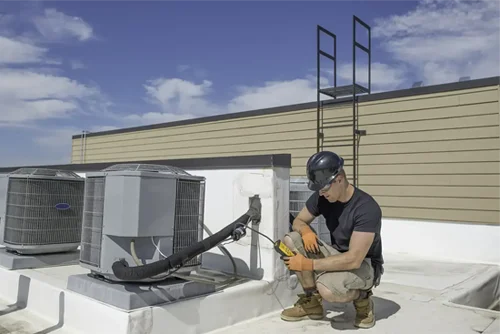
While your air conditioning (AC) system dutifully works to keep your indoor environment cool and comfortable, an often underestimated adversary lurks outside – outdoor debris. This blog post aims to shed light on the often-overlooked impact of outdoor debris on AC system efficiency. From leaves and dirt to fallen branches, understanding the potential challenges posed by external elements is crucial for maintaining optimal performance and extending the lifespan of your AC unit.
The Silent Invaders: Leaves and Foliage
As the seasons change, trees shed their leaves, and these seemingly harmless debris can find their way into your AC unit. Accumulated leaves hinder airflow, leading to reduced efficiency and potentially causing strain on the system’s components.
Dirt and Dust: The Covert Culprits
Dust and dirt particles are adept at finding their way into AC units. Over time, these particles accumulate on condenser coils and other crucial components, forming a barrier that impedes heat exchange. This accumulation forces the system to work harder, resulting in decreased efficiency.
Branches and Foliage: A Threat to Your Condenser
Overhanging branches and foliage near the condenser unit pose a dual threat. Not only do they drop leaves and debris into the unit, but they also cast shade. While shade can be beneficial in moderation, excessive shading can compromise the condenser’s ability to dissipate heat efficiently.
Grass Clippings and Yard Debris
Yard maintenance activities, such as mowing the lawn, can introduce grass clippings and other debris into the vicinity of your AC unit. These particles may infiltrate the unit, hindering airflow and disrupting the delicate balance required for optimal cooling.
Impact on Airflow: The Domino Effect
Outdoor debris, regardless of its origin, tends to obstruct the free flow of air through the AC unit. Restricted airflow translates to diminished cooling capacity, increased energy consumption, and a system that may struggle to maintain the desired indoor temperature.
Reduced Heat Exchange Efficiency
The efficiency of an AC system hinges on its ability to exchange heat effectively. Debris on condenser coils impedes this exchange, leading to an overheated system that operates less efficiently. Regular cleaning is essential to preserve this critical function.
System Strain and Wear
An AC unit working against the resistance of outdoor debris is subjected to increased strain. Over time, this strain can lead to accelerated wear on components, potentially resulting in more frequent breakdowns and the need for costly repairs.
Preventive Measures
Regular maintenance, including clearing debris from around the AC unit, is a simple yet effective preventive measure. Trim overhanging branches, remove leaves and debris, and ensure a clear path for airflow to maximize your system’s efficiency.
Professional Cleaning
Engaging in routine professional cleaning is a wise investment. HVAC technicians possess the expertise to thoroughly clean components, ensuring optimal performance and prolonging the lifespan of your AC system.
Long-Term Efficiency and Savings
By acknowledging the impact of outdoor debris and adopting proactive measures, you not only enhance the immediate efficiency of your AC system but also contribute to long-term savings. A well-maintained system operates more efficiently, consuming less energy and minimizing the risk of costly repairs.
Conclusion
The battle for AC efficiency extends beyond the confines of your home. Outdoor debris poses a tangible threat that, if ignored, can compromise the performance and lifespan of your AC system. By staying vigilant and implementing regular maintenance practices, you safeguard your investment, ensuring that your AC unit operates at its best, keeping you cool and comfortable when you need it most.